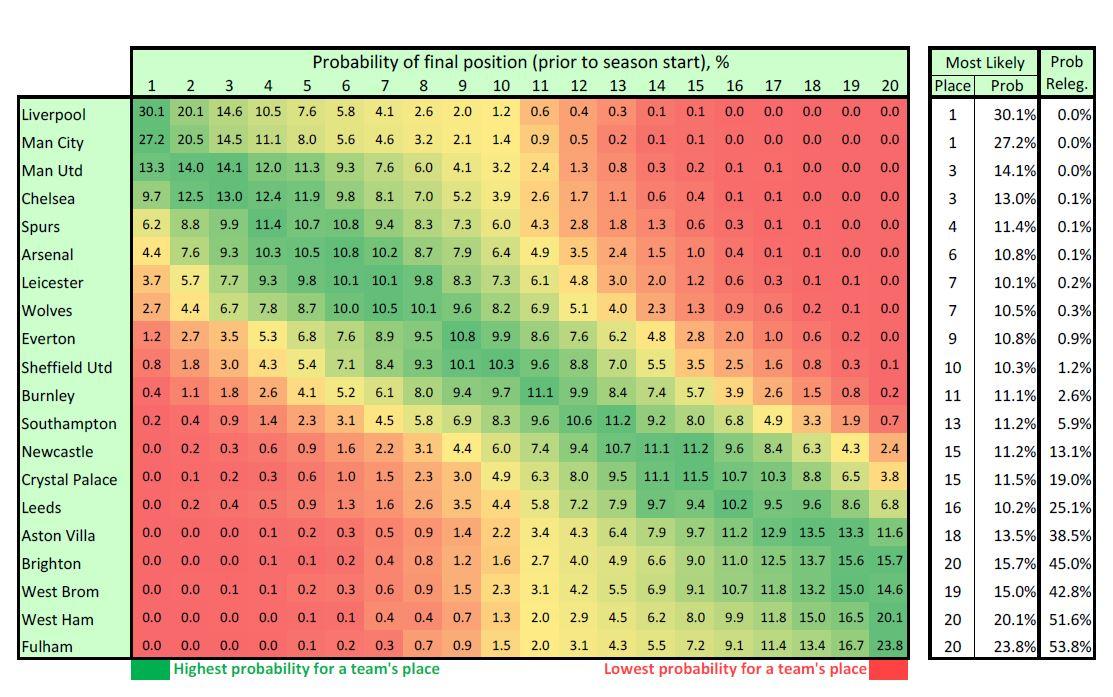2020-21 English Premier League - winners and losers

Probability of final position (prior to start of season). The chart shows, for each team, the probability (in percentage) that they will finish in any given place in the league from 1 to 20. The darkest green colour shows the highest probability place and the darkest red the lowest probability. To read the figure, pick a team and then read the probabilities from left to right. The table on the left hand side indicates the team’s placing with the highest probability and also the chance of being relegated.
Liverpool, who won last year's English Premier League (EPL), has a 30.1% chance of coming top of this year's season according to the University of Adelaide's Professor Steve Begg. manchester City's most likely place to finish is also number one, but with a lower probability (27.2%) than Liverpool. Fulham and West Ham are likely to be relegated, with Aston Villa, West Bromwich Albion and Brighton also fighting to avoid the drop.
The 2020/21 EPL kicks off on Saturday 12 September 2020. An estimated 4.7 billion people watch the league each year. It is the most-watched sports league in the world, broadcast in 212 territories to 643 million homes.
Professor Steve Begg from the University’s Australian School of Petroleum and Energy Resources has developed a way of calculating the probability of each team finishing in any given position using uncertainty modelling. He uses this technique in his ‘day job’: researching how to make better business decisions.
“When the outcomes of decisions are influenced by things beyond our control, such as most business decisions, the uncertainty often makes the predictions very counter-intuitive. Unfortunately, we humans have not evolved a good capability to reason correctly when we are in uncertain or complex situations,” says Professor Begg.
“In the Premier League uncertainty influences the many ways the season might turn out. What makes the outcome of the league so hard to predict is not just uncertainty in a team’s average ‘form’ across the season, but their specific ‘match form’, which can include random factors that can influence the outcome of a game.”
Surprisingly, the lack of crowds at football matches due to COVID-19 restrictions seems not to have had an impact.
“It has always been thought that the home team advantage was mainly due to the vocal support of the home team fans, enthusing the team. But my analysis of last year’s matches, post-COVID lock-outs, showed that the home team win-rate was not affected by the absence of fans. This raises an intriguing question about the real cause of the home-team advantage,” says Professor Begg.
Professor Begg used ‘Monte Carlo simulation’ to predict the probabilities of how the 2020-2021 season will turn out. The technique was first developed in the Second World War by scientists working on the atomic bomb.
“It goes beyond many modern-day artificial intelligence and machine learning algorithms by generating the probabilities of many possible outcomes, not just a single ‘best’ prediction,” he says.
He assesses the uncertainty in a team’s average form for the upcoming season based on their performance trend over the last three years, their short-term trend towards the end of last season, and player transfers during the off-season. He uses this information, along with the random factors, to generate a specific ‘match form’ for the pair of teams involved in each match, and bases the score on their relative values.
Professor Begg has generated 100,000 simulations of how the whole season of 380 matches could play out – although there are 2,432 quadrillion ways the final positions could be arranged, 100,000 simulations are ‘more than enough’ to assess the probability of each team finishing in any given place. The simulations are constrained to ensure consistency with typical numbers of home wins, draws, losses, goals and points from the last 10 years of the EPL. He can run over 10,000 different simulations per minute on his laptop computer. The results for all teams are shown in the chart.
Over the course of the coming season, Professor Begg intends to periodically update the uncertainty in each team’s season-form, to take account of how they are actually performing, and re-run the simulations
“As a dyed-in-the-wool Manchester City fan since 1967 I would love to see them win their fifth title. However, I have learned that emotions, wishful-thinking and intuition often lead to poor predictions and bad decisions. I can do better by minimizing personal biases and relying on simple uncertainty models, grounded in actual data,” he says.
Media Contacts:
Professor Steve Begg, University of Adelaide. Mobile: +61 (0)422 008 984, Email: steve.begg@adelaide.edu.au
Elisa Black, Manager – News and Media, The University of Adelaide. Mobile: +61 (0)466 460 959, Email: elisa.black@adelaide.edu.au
